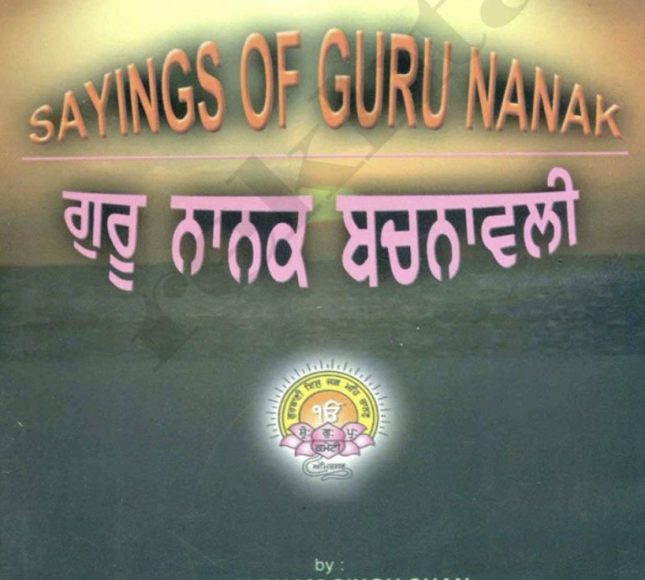Singh ‘Shan’, Harnam, an eminent Punjabi poet, writer and journalist, was born at Dhamial (District Rawalpindi, now in Pakistan) in 1923 in the family of S. Sarban Singh Kochar. He did his post-graduation (English and Punjabi) from Punjab University, Chandigarh and his doctorate from the University of London in 1964 on the Romance of Sassi ”A Critical and Comparative Study. He started his career as an editor in the Punjabi University (1948-58) and rose to the position of Professor and Head of the Department of Punjabi (1959-62) and chairman, Department of Sikh Studies (1972-84) in the same institution.
He is a widely travelled scholar, who has visited and attended international conferences and seminars held in Pakistan, the United Kingdom, Iran, the United States of America, Germany, Egypt, Australia, Thailand, Singapore, Hongkong, Malaysia, Mexico, Canada and Japan. He is associated with many national and international societies such as All India Oriental Conference, Pune; Guru Nanak Foundation, New Delhi; P.E.N., Bombay; Royal Asiatic Society of Great Britain and Ireland, London; Societe Asiatique, Paris; Folklore Society, London; Society for Asian Folklore, Bloomington; Association of British Orientalists, London; American Oriental Society, New Haven; Britannica Society, Edinburgh, etc. He has delivered innumerable lectures on literary, historical, religious, cultural, and academic topics at various Indian and foreign universities/institutions. He is the author of seventy-one books”original and annotated.
His main original works are Usarda Punjab (1954); Sassi-Hashim (1956) unique for research, critical acumen, comparative study, comprehensiveness, and annotation. Roti beti di sanjh (1959); Punjabi parakh parchol ”-janam te vikas (I960): Puran Singh da Punjab piar (1968); Bhai Vir Singh te unahan di den(1972); Bhai Vir Singh da sandesh (1973); Guru Nanak da Shahakar Japji (1975). In addition to Punjabi he has written books in English as well, such as: Sayings of Guru Nanak (1969); Guru Nanak in His Own Words (1970); Guru Nanak\’s Moral Code, (1970); God as Known to Guru Nanak (1971); Guru Nanak The man and His Mission (1974); So Said Guru Amar Dass (1985); Teachings of Guru Nanak, (1986). He is considered to be an authority on Punjabi medieval literature, Sikh theology and history. He won special awards from the Punjab Government in 1968 for his contribution to Punjabi literature and in 1978 for Guru Nanak\’s Shahkar Japji.
References :
1. Amarjit Singh, Punjabi sahit da itihas ”Qissa kal, Amritsar, 1981.
2. Encyclopaedia of Indian Literature, 6 Vols., Delhi, 1995.
3. Kohli, S.S., Punjabi Sahit da Itihas, Ludhiana, 1955.
4. Mohan Singh, A History of Punjabi Literature, Amritsar, 1956.
5. Ramdev, Jaginder Singh (ed.), Punjabi Likhari Kosh, Jullundur, 1964.
6. Sekhon, S.S. and K.S. Duggal, A History of Punjabi Literature, Delhi, 1992.
7. Singh, N.K., Encyclopaedia of Indian Biography, Delhi, 2000.
Shan Singh, often affectionately known as Harnam Singh “Shan,” is revered in the world of Punjabi literature as both a distinguished poet and an erudite scholar. His work spans the intricate realms of creative poetry, thoughtful critical analysis, and historical research into Sikh heritage, establishing him as an academic authority on Punjabi literary traditions as well as Sikh history and culture .
A Voice of Poetic Elegance and Intellectual Depth
Shan Singh’s poetry is celebrated for its lyrical quality and its sensitive portrayal of the human condition. Whether exploring themes of love, melancholy, or spiritual introspection, his verses resonate with a clarity that bridges the emotive pulse of Punjabi folk traditions with sophisticated literary expression. His poetic oeuvre reflects a deep engagement with the cultural and philosophical impulses that shape Sikh identity, offering readers a rich tapestry of images and ideas that evoke both personal intimacy and collective memory.
A Scholar and Custodian of Sikh History
In addition to his creative talent, Shan Singh has contributed significantly to the academic study of Sikh literature and history. His scholarly work delves into the evolution of Punjabi literary forms and the historical narratives that have defined Sikh thought over the centuries. By meticulously researching and interpreting primary texts, he has helped preserve critical aspects of Sikh heritage and provided new insights into how literature functions as a medium of cultural continuity and transformation. His academic endeavors have made him a respected mentor and institution-builder in the field, inspiring subsequent generations to pursue both creative and critical engagements with Punjabi literature .
Enduring Influence and Cultural Relevance
The dual legacy of Shan Singh—as both an artist who captures the soulful rhythms of everyday life and as a scholar who unearths the deeper layers of historical narrative—continues to influence contemporary Punjabi literature. His interdisciplinary approach has not only enriched the literary canon but has also enhanced the pedagogical framework within which Sikh history is taught. Through his fusion of poetic sensitivity and scholarly rigor, Shan Singh exemplifies the dynamic interplay between art and learning, ensuring that the vibrancy of Punjabi language and culture endures in the modern era.



